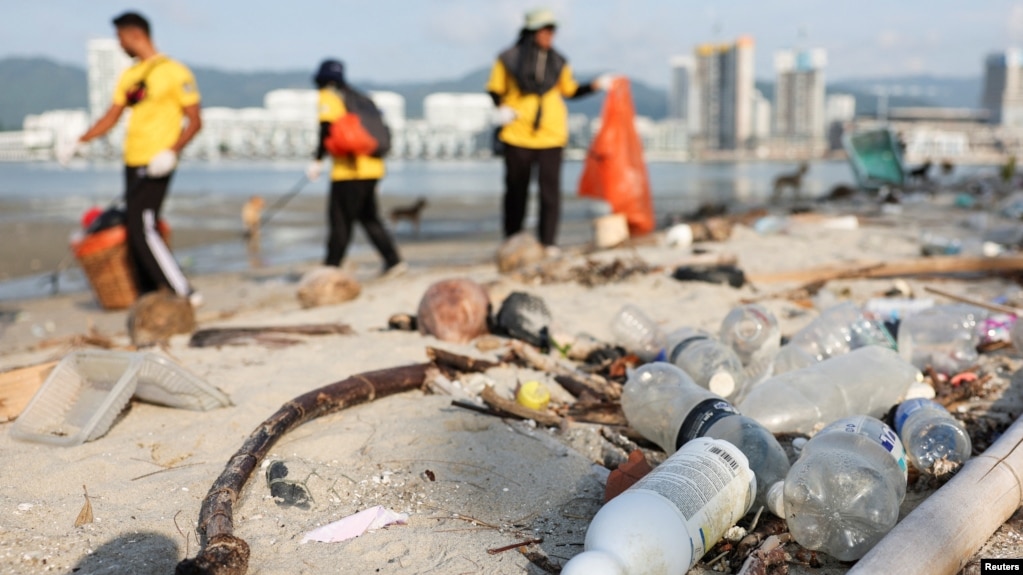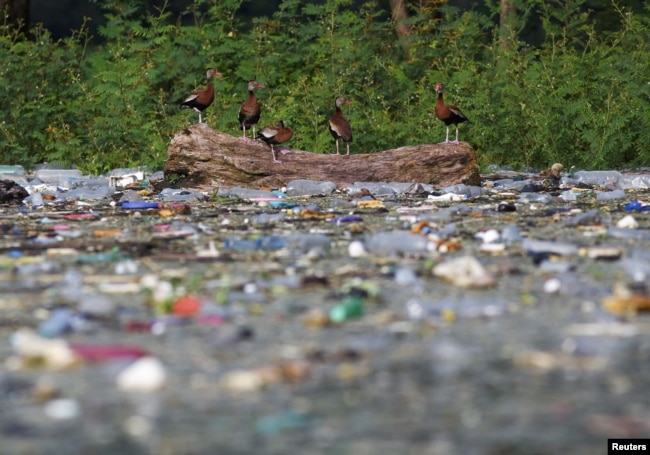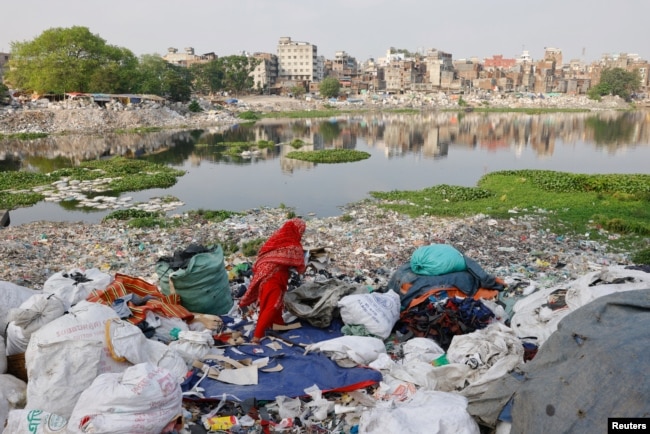AUDIO
What Countries, Industry, Activists Want in Plastics Treaty

International negotiators are meeting in Canada’s capital to discuss writing a treaty to control plastic and pollution linked to it.
The meeting in Ottawa is part of the United Nations Environmental Programme and is to last until April 29.
Supporters say the agreement would be the biggest related to carbon gas creation and environmental protection since the 2015 Paris Agreement. In that agreement, about 195 parties agreed to keep average world temperatures from rising more than 1.5 degrees Celsius compared to pre-industrial times.
But delegates to the negotiations on plastics are divided over what the treaty should include.
What are the talks about?
At the U.N Environmental Assembly in 2022, nations agreed to develop an agreement with the force of law, or a treaty, on plastics. The goal was to have a treaty by the end of 2024.
Negotiators aim to make rules about plastics throughout the life of plastic products. That includes when they are produced, how they are used, and how they are thrown away.
What is the problem with plastics?
Plastic waste has become a world problem on land and in the sea. Supporters of a treaty also say producing plastics involves releasing greenhouse gases.
The U.S. federal Lawrence Berkeley National Laboratory in California recently released a report on plastic pollution. The report said the plastics industry now produces five percent of the world’s carbon gases. But the U.S. government laboratory said that the industry’s share of carbon gases could grow a lot if its current growth models behave as expected.
Reuters news service says plastic production is estimated to triple by 2060 without production limits. Most new chemicals for plastics are made from petroleum.

Difficulties in the negotiations
This week’s talks are set to be the biggest yet and include 3,500 people registered to attend including lobbyists, business leaders, scientists and environmental nonprofit groups.
But countries are divided on the issues after three earlier rounds of talks. They were held in Punta del Este, Uruguay; Paris; and most recently in Nairobi, Kenya.
At the talks in Nairobi in November, the proposed treaty expanded from 30 to 70 pages. Some countries objected to measures like production limits and requiring a halt to production of some products.
Countries hope to find common ground before final negotiations are held in December in Busan, South Korea.
What do countries want in the treaty?
Many countries that produce plastics and countries that produce chemicals for plastics opposed production limits. Those countries include Saudi Arabia, Iran, and China. They are collectively known as the group of “Like-Minded Countries.”
They have blocked other countries from calling for production limits, chemical disclosures, or reduction timelines after last year’s meeting in Nairobi.
A group of 60 nations wants to end plastic pollution by 2040. They are called the “High-Ambition Coalition.” The group includes European Union countries, island nations, Japan, and the United Arab Emirates.
Some environmental groups support the “High-Ambition Coalition.” It has called for agreements to limit and reduce the production and use of plastics to “sustainable” levels. It also is proposing measures to end the use of “problematic” single-use plastics over time and to ban some chemicals that might carry health risks.
The United States says it also wants to end plastic pollution by 2040. But unlike the “High-Ambition Coalition,” it wants countries to set their own plans. In addition, the U.S. wants countries to regularly inform the U.N. of their plans.

What does the industry want?
The trade group Global Partners for Plastics Circularity represents major producers of chemicals used in plastics. It includes members of the American Chemical Council and Plastics Europe.
The group argues that production limits would lead to higher prices for buyers. It says that the treaty should deal with plastics only after they are made.
The chemical companies support the reuse or recycling of plastics. They support developing the market for burning plastics for fuel. Additionally, the group said companies should be permitted to release information about chemical processes voluntarily. However, a Reuters investigation in July of 2021 said that many attempts by big oil companies to recycle plastics were not successful.
What do companies want?
More than 200 companies including PepsiCo and Walmart have joined a group called the Business Coalition for a Plastics Treaty.
Like the petrochemical industry, these companies depend on plastic containers for their products. They have been involved in the negotiations.
In a statement, the coalition said it supports a treaty that includes production limits and uses “restrictions and phase-outs.” Additionally, the group said it supported reuse policies, product design requirements, increased producer responsibility and policies for dealing with waste.
______________________________________________________
Words in This Story
greenhouse gases –n. gases that are believed to trap heat and warm the atmosphere
petroleum – n. a kind of oil that comes from below the ground and that is the source of gasoline and other products
lobby – v. to try to influence government officials to make decisions for or against something
disclose – v. to make (something) known to the public
sustainable – adj. involving methods that do not completely use up or destroy natural resources
recycle – v. to make something new from something that has been used before or to reuse something in a new way
phase-out –n. an effort to end a method or activity by slowly reducing it over a long period until it no longer exists
https://learningenglish.voanews.com/a/what-countries-industry-activists-want-in-plastics-treaty/7581505.html